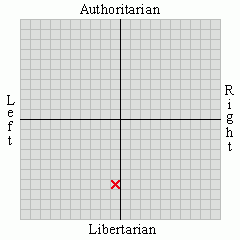I wished to respond to points made by Dan and Spidie in my last post but for some reason blogger is being an arse, so I'll post my points as an entry:
I'm not exactly sold on PR or anything - but my view is we already have the worst aspect of a PR system, ie party rule
A primary or caucus would certainly be better - but that has flaws, everyone would have to join the party, leading us to American-style politics and an even more cemented two-party system
I also still don't like the 'local' thing - it's all very well to use a caucus to elect a decent local candidate but until the MP actually has some sort of power then all I see is a disjointed system propping up the two main parties - direct plurality voting is fine, but you're not actually voting for that MP to represent you, you're voting for the party as a whole - to me, until that's changed, the FPtP system remains intrinsically unfair, the way parliament works needs a change first
Weak government? Often thrown out, and it's true it's hard to get rid of a government totally, but can we really say we have 'strong' government? Most people seem to hark back to Thatcher when talking about that...is Brown strong? Did we really like the electoral dictatorship of 'president' Blair?
The choice we get is Brown and Cameron - doesn't seem like much of a choice to me, and there doesn't seem to be a huge difference, what exactly are we voting for? All I see is two parties who want power
Personally I think it's a red herring when there's really only two major countries that use our system - the US and us, are we any better off than Germany, or indeed most major nations?
I don't really support PR as such, but simply see it as the lesser of two evils, I think it would be fairer in our current situation...but really Parliament needs a massive overhaul in general and people need to be more engaged and I think the plurality system we have is a massive impediment to voter engagement
15 February 2010
Subscribe to:
Post Comments (Atom)





Tarquin. I do see your points, but I guess I just can't concede the notion that anything other than FPtP secures the very top selected person - or the person or party that made the best argument. Of course with safe seats it is not always the case and we go around in circles.
ReplyDeleteAlso, what happens under PR when a MP drawn from a multi region steps down or retires - how is that void filled? (Genuinely would not know the answer to that!)
My nightmare scenario under PR is that with the current cabinet system, we could see 4th or 5th placed candidates from Party Lists taking high office. It just does not sit right with my instincts. Maybe my instinct rules over my head on this particular issue.
In an Open Primary anyone can vote, regardless of party membership or allegiance. Now, this is not my preferred option as I would forsee the potential for a party to organise their base to help secure a win for who they perceive to be a weaker candidate... But I do think a move to where candidates are selected by some form prior to the General Election would be a positive move. I personally think each party locally could use their preferred method and just see what does and does not work.
Off topic, I just want to say thanks for the comments over at mine... I do sometimes think I have an argument completely covered and then up you pop and make me think again - I value that as much as I do the comments I get (from you and others) in agreement.
ta very much, Dan - I also welcome your input (or anyone who contributes thoughtfully for that matter) - I think we're all the same really, I see all those wasted votes and the seat allocation and I just can't see a defence for Fptp - obviously not everyone agrees with me and rightly throw up problems with other systems, so it grounds me I guess
ReplyDeleteMy main issue lies with the votes cast - there's a difference of less than 800,000 between the main two, or about 3% of votes cast - how does that translate into a difference of 160 seats? Labour can actually win with less votes...
As I've said before, if it's about local MPs then fine, but it's not is it? It's national, it's about people voting for Cameron, Clegg and the other one, the actual MPs mean next-to-nothing, they're just party apparatchiks plonked into the seats, as far as I'm concerned that's exactly the same as a PR system, just without the fair part
It's true proper PR isn't a good system, and I don't really support it, but I do think we have to marry the two somehow so that all votes are counted and the system isn't manipulated into unanswerable governments who are supported by 35% of the voters
I love this graph: http://en.wikipedia.org/wiki/File:Results_of_the_UK_General_Election,_2005.svg